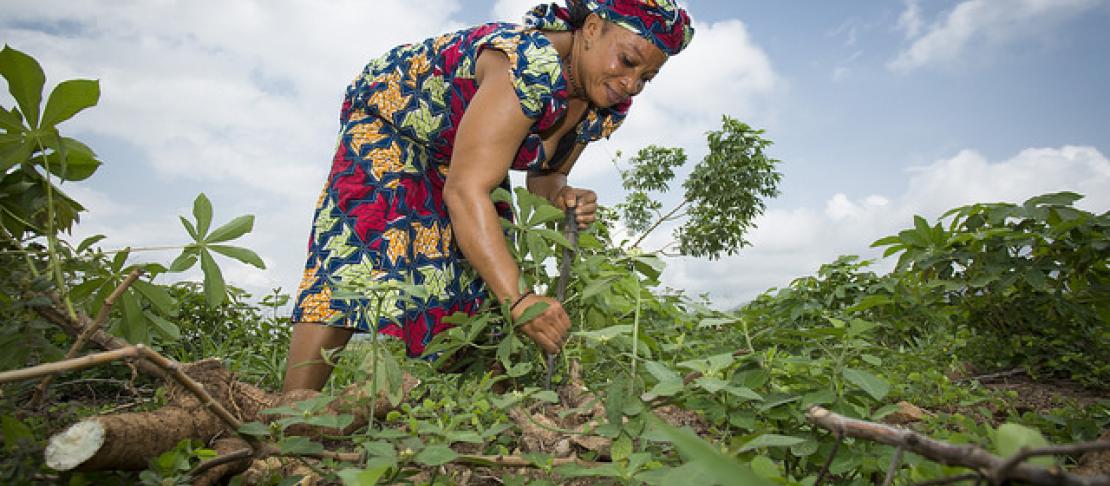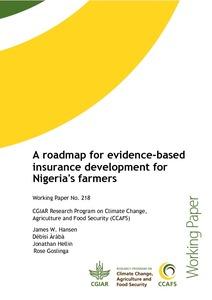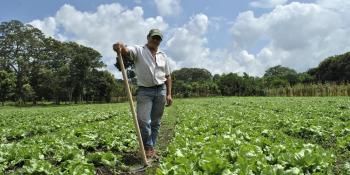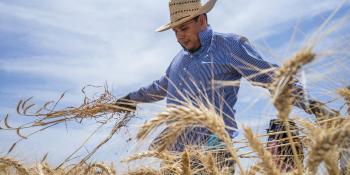Transforming agriculture in Nigeria must involve agricultural insurance

New roadmap for agricultural insurance lays out a clear path forward in Nigeria.
Agriculture in Nigeria is a critical branch of the economy, providing direct employment for about 30% of the population, while the sector contributes about 24% to the country's GDP, according to a study from the Nigerian Bureau of Statistics, Nigeria.
Climate change is threatening this important industry. In fact, direct effects of climate change on agriculture in Nigeria include fluctuations in rainfall and variable temperatures, altering growing seasons, changes in planting and harvesting calendars, and difficulties in water availability, among others.
In view of these realities, Nigeria's Federal Ministry of Agriculture and Rural Development (FMARD) has found it necessary to develop a National Agricultural Resilience Framework that defines a pathway for better adaptation of Nigerian agriculture to the shocks and stress of climate change.
As part of this framework, the CGIAR Research Program on Climate Change, Agriculture and Food Security (CCAFS) has been collaborating with FMARD and the International Center for Tropical Agriculture (CIAT) to develop a roadmap for climate insurance as a means to increase the resilience of small-scale farmers. Presented in the form of a working paper, the roadmap is entitled “A roadmap for evidence-based insurance development for Nigeria's farmers”, and is designed to inform the development of inclusive insurance for Nigeria’s agriculture sector.
The collaboration between FMARD and CCAFS started in September 2014 during COP20 held in Lima. Three years later, on November 17, 2017, the official launch of the document marked a turning point in the implementation process of the National Agricultural Resilience Framework. The event took place in Abuja, at FMARD’s headquarters.
Jim Hansen, leader of CCAFS research on climate services and safety nets, said agriculture insurance is a well-established way to increase farmers’ resilience in the face of various production risks.
"Farmers insuring their crops is the new paradigm in developed countries and will now benefit Nigerian farmers," said Sunday Edigbo, Director of Agricultural Land Resources and Climate Change in an article of the Agro Nigeria online newspaper. Urging farmers to insure their crops and obtain financial support will boost their ability to cope in the event of a disaster.
Dr. Adebisi Araba, the CIAT Regional Director for Africa, added:
The effects of climate change are a huge challenge for farmers and for food security in Nigeria and in Africa. Climate can’t be controlled, but we can mitigate it by promoting agriculture risk management mechanisms through weather insurance. This launch will aim to achieve that."
The working paper developed by FMARD and CCAFS details how a well-designed index insurance programme can achieve specific risk objectives such as protecting farmers’ livelihoods in the face of major climate shocks and promoting farmers’ livelihoods.
The paper puts forward a strategy for agricultural insurance development in Nigeria. In addition, it outlines a series of steps to make new innovations in agricultural insurance available to more of the nation’s farmers. Lessons from insurance initiatives in other parts of the world offer several success factors that are relevant to the situation in Nigeria:
- First, successful initiatives have been designed to unlock particular opportunities for farmers that were previously constrained by particular risks.
- Second, initiatives are most successful when they are driven by demand and responsive to farmer input.
- Third, successful initiatives have invested in the capacity of a range of local stakeholders.
- Fourth, investments in data systems, and in science-based index development, have helped address the challenges of data poverty and basis risk.
- Fifth, successful index insurance requires an enabling regulatory environment.
- Finally, successful initiatives involve multi-stakeholder partnerships, and often public-private partnerships.
The launch event was greatly important for emphasizing the critical nature of the availability of such strategic roadmaps in agricultural adaptation, mitigation, and resilience strategies to climate change.
Further, the opportunity has been useful for raising awareness among farmers for the consideration of climate insurance as a means of climate risk management.
Read more:
- Hansen JW, Araba D, Hellin J, Goslinga R. 2017. A roadmap for evidence-based insurance development for Nigeria’s farmers. CCAFS Working Paper no. 218. Wageningen, Netherlands: CGIAR Research Program on Climate Change, Agriculture and Food Security (CCAFS).
- Press release: New roadmap launched to help farmers cope with extreme weather and tap opportunities in agriculture
Media coverage:
- AgroNigeria: Evidence-Based Insurance Roadmap to boost farmers productivity launched in Abuja
- Daily Trust: Climate change puts smallscale-farmers in hotspot
- EnviroNews Nigeria: Government, CGIAR launch new climate change insurance roadmap for farmers
- Independent Nigeria: FMARD Releases Roadmap For Agric Insurance Devt
- Independent Nigeria: FG Launches New Climate Change Insurance For Farmers
- Leadership Nigeria: Agriculture: Evidence-Based Insurance Road Map For Farmers Launched
Dansira Dembele is communication officer at CCAFS in West Africa based at ICRISAT, Bamako, Mali.




